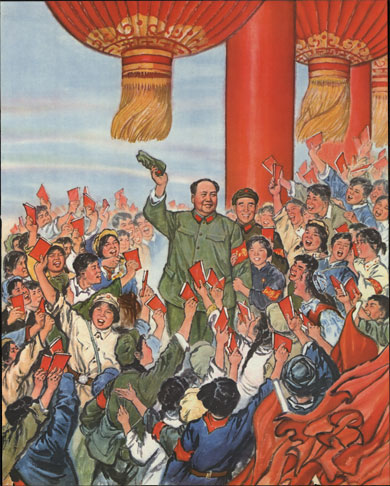The Death of Wood Fairy
Sid often tells this story to describe the conditions he met in China and how they motivated him to stay and work for the Chinese people. It begins in 1945 soon after he arrived in China as a GI linguist, in the waning days of World War II . . . .
Shortly after I arrived in China, I was assigned as a Chinese language specialist in the judge advocate's office in Kunming, in southwestern China. During the war Kunming was an entry point for soldiers flown in over the Hump of the Himalayas from India to China. The place overflowed with GIs. There was a thriving black market in American medicine, Spam, cigarettes, gas, and clothing. Alcohol was plentiful and there was little to do in the evening but drink. So it wasn't surprising that the judge advocate's office was investigating claims for damages against the U.S. Army. Five of us were assigned there, all classmates from language school. My job was to verify the claims. I would drive my jeep though the streets of the town, find the plaintiffs, interview them, and translate all the information onto U.S. government forms.
The file of Li Ruishan the rickshaw puller was the first one I was handed. After reading through the documents, I drove off in my jeep to find him. His street wasn't hard to locate. It was a tiny twisting hairpin of an alley just off one of the main thoroughfares of Kunming, the Road to the Opening of the East. It was lined with mud-brick houses, crowded with people gargling, hawking wares, drying hair, washing clothes, peeling vegetables, and tending children.
Once in the alley, it wasn't hard to find Li's house either. When I drove through in my U.S. Army jeep, everyone was expecting me. Many of Li's neighbors and relatives had been out on the street that morning a few months earlier when an army truck had come barreling through, crushing to death the rickshaw puller's only child. They had seen the accident and knew that Li's wife, Wood Fairy's mother, was catatonic with shock and grief. They knew that Li had pressed a claim against the U.S. government.
Plaintiffs would never come to our offices themselves to present their claims. The distance was daunting. Our barracks was several miles outside town, in an encampment run by the Kuomintang army of Chiang Kai-shek, surrounded by a high wall and guarded by soldiers. But the main problem was that most people in Kunming in those days were illiterate. Rather than presenting their claims to us, they first went to their street chief, who was in charge of a dozen families. The street chief would then pass the claim to the block chief, who handled a dozen street chiefs. Together, they would compose the claim in flowing brush strokes on rice paper, and pass it up through the county government and on to us. At each level, the Chinese bureaucracy would exact its price in "squeeze" from the hapless claimant.
By the time I was handed Wood Fairy's case, the deposition of the driver who had killed her had already been taken. The air force sergeant had said in his statement that the night before the accident he had borrowed a six-by-six army truck to drive to the Streets of Paris nightclub in town. He picked up one of the skinny, half-starved dancing girls there and woke up the next morning to find himself AWOL with a splitting headache. He downed a couple of shots of whiskey for his hangover and took off for the base.
About halfway home, he made a sharp right turn into an alley that led to a road parallel to the base. He saw a little girl playing shuttlecock in the doorway of her mud house. Later, he told the provost marshal that he thought it would be fun to scare her. "I said to myself I'm going to see how close I can get to that little slopey girl, and goddamn if I didn't run her over, so I figured I've got to get the hell out of here," he said in his deposition. So he quickly headed the truck back to the base.
Now I was back in that same little alley and soon I saw rickshaw puller Li arrive, a crowd of neighbors accompanying him. He was a little taller than I, perhaps five foot eight, and looked to be in his mid-forties, so I guessed he was in his early thirties. In a twelve- hour day of trundling passengers, a rickshaw puller in Kunming during the war typically earned no more than enough for a bowl or two of rice for himself and his family. A bony man with a drooping mustache and bare feet, Li was worn out.
"Our life is nothing," he said, speaking very quietly and directly, in a Yunnan accent thick with consonants. "It is nothing but eating bitterness. She was all we had. We were hoping that she would have something better."
He was talking about a monumental injustice, but his speech was nearly expressionless. He hadn't seen the accident, but his wife had watched her daughter crushed to death by a driver who didn't stop. Li took me to their little room and pulled back the bamboo screen. His wife was sitting silent and motionless, staring at the wall. She never spoke again after the accident, and died a few months later.
Back at the office, I wrote up the report, recommending the highest possible compensation. I had warned Li that it wouldn't be much, but as it turned out, it was worse than I thought. A few weeks later, the assistant claims officer made his recommendation: $26 U.S. I thought there had been a mistake and took the matter up with him. I pointed out that in another recent case, we had paid a merchant $150 in compensation for his pony, which had been killed by another American army truck. "A horse comes with a price tag and a receipt," said the assistant claims officer. "A person doesn't come with a price tag. The only way you can figure their value is by finding out what they added to the family income, and what it costs to bury them. In this case, it was a little child who earned no income, and a pine coffin for a child costs only half as much as an adult coffin. Also, the rules are that you pay less compensation to those in lower income brackets. My original judgment stands."
I returned to that narrow alley, and when I handed Li the envelope containing the $26 I tried to apologize for the unjust treatment of his case. He took the envelope, bowed and walked away. But that afternoon, just before five, he appeared at my desk, having walked the many miles to the barracks and negotiated his way past the guards. This time he carried his own envelope, one pasted together out of scrap, which he handed to me. I found six dollars inside.
"What is this for?" I asked.
"To thank you for your help."
"Did you give money to the block chief too?" I asked. "Yes," he replied.
"And to the street chief?"
"Yes."
I suddenly understood. In his mind, I had become one of the many forces that buffeted his life. Even after such a disastrous wrong had been done to him, Li still felt compelled to split his compensation with each official who had in any way contributed to his receiving the money—including a member of the foreign army that killed his daughter. Chinese officialdom lived on such squeeze and made life hard for those who tried to evade it. To Li, it made sense to try to placate even those who had persecuted him.
"I cannot take this," I explained to him, handing back the envelope. "It is against regulations, and it would be very wrong anyway because what you received was much too little." I thought I saw the beginnings of a faint smile flickering across his face at the words "gui ding"—regulations. He knew all about regulations, I supposed. At any rate, he bowed, thanked me, and then turned and left the office.
I never saw him again.
But later, even after things went bad, I often thought of Li, and of his little daughter. I think that I chose the road I did and stuck to it as long as I did because, like so many others I came to know, I genuinely believed it was the only way I could help change the miserable lives of people like Li Ruishan and his daughter, Wood Fairy.
For when the time came to choose, I had a bellyful of the misery I had seen.
Reprinted from The Man Who Stayed Behind, Duke University Press, with permission of the author.


